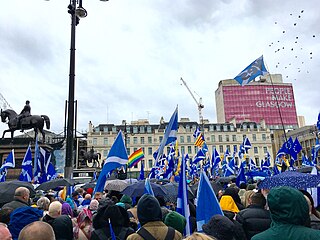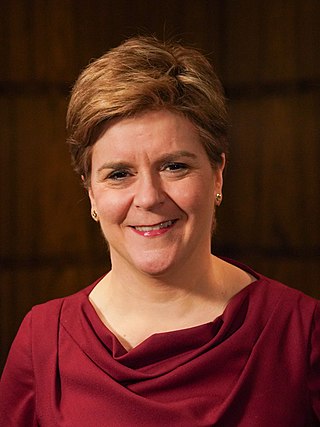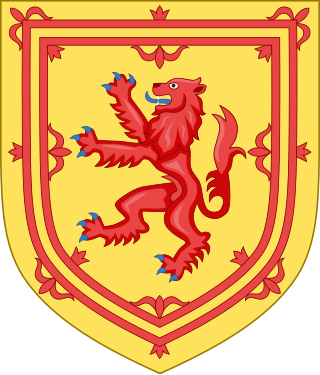The Scottish National Party is a Scottish nationalist and social democratic political party in Scotland. The SNP supports and campaigns for Scottish independence or secession from the United Kingdom and for Scotland's membership of the European Union, with a platform based on civic nationalism. The SNP is the largest political party in Scotland, where it has the most seats in the Scottish Parliament and 45 out of the 59 Scottish seats in the House of Commons at Westminster, and it is the third-largest political party by membership in the United Kingdom, behind the Labour Party and the Conservative Party. The current Scottish National Party leader, Nicola Sturgeon, has served as First Minister of Scotland since 20 November 2014, though she announced her forthcoming resignation from these roles in a press conference on 15 February 2023.

Scottish independence is the notion of Scotland as a sovereign state, independent from the United Kingdom, and refers to the political movement that is campaigning to bring it about.

Nicola Ferguson Sturgeon is a Scottish politician who has served as first minister of Scotland and leader of the Scottish National Party (SNP) since 2014. On 15 February 2023, Sturgeon announced that she would resign from both roles and will remain in office until a successor has been elected. She has served as a member of the Scottish Parliament (MSP) since 1999, first as an additional member for the Glasgow electoral region, and as the member for Glasgow Southside from 2007.

The Scottish devolution referendum of 1997 was a pre-legislative referendum held in Scotland on 11 September 1997 over whether there was support for the creation of a Scottish Parliament with devolved powers, and whether the Parliament should have tax-varying powers. The result was "Yes–Yes": a majority voted in favour of both proposals, and the Parliament was established following an election in 1999. Turnout for the referendum was 60.4%.
In Scotland, the Scottish National Party (SNP) is a left social democratic political party which campaigns for Scottish independence. The SNP has controlled Scotland's devolved legislature since the 2007 election as a minority government, and were a majority government from the 2011 election and have been a minority government, since the 2016 election. Its current leader, Nicola Sturgeon, is the First Minister of Scotland.

Johann MacDougall Lamont is a Scottish Labour Co-operative politician who served as Leader of the Scottish Labour Party from 2011 to 2014. She was previously a junior Scottish Executive minister from 2004 to 2007 and Deputy Leader of the Scottish Labour Party from 2008 until her election to the leadership in 2011. In addition to her ministerial and leadership roles, she has been a campaigner on equality issues and violence against women throughout her political career.

The National Conversation was the name given to the Scottish Government's public consultation exercise regarding possible future changes in the power of the devolved Scottish Parliament and the possibility of Scottish independence, a policy objective of the Scottish National Party, who at the time were the minority government with power over devolved affairs in Scotland, as the Scottish Government. It culminated in a multi-option white paper for a proposed Referendum (Scotland) Bill, 2010.
Full fiscal autonomy (FFA) – also known as devolution max, devo-max, or fiscal federalism – is a particular form of far-reaching devolution proposed for Scotland and for Wales. The term has come to describe a constitutional arrangement in which instead of receiving a block grant from the UK Exchequer as at present, the Scottish Parliament or the Senedd would receive all taxation levied in Scotland or Wales; it would be responsible for most spending in Scotland or Wales but make payments to the UK government to cover Scotland or Wales's share of the cost of providing certain UK-wide services, largely defence and foreign relations. Scottish/Welsh fiscal autonomy – stopping short of full political independence – is usually promoted by advocates of a federal United Kingdom.

Alexander Elliot Anderson Salmond is a Scottish politician and economist who served as First Minister of Scotland from 2007 to 2014. A prominent figure in the Scottish nationalist movement, he has served as leader of the Alba Party since 2021. Salmond was leader of the Scottish National Party (SNP), on two occasions, from 1990 to 2000 and from 2004 to 2014. He served as the party's depute leader from 1987 to 1990.

A referendum on Scottish independence from the United Kingdom was held in Scotland on 18 September 2014. The referendum question was, "Should Scotland be an independent country?", which voters answered with "Yes" or "No". The "No" side won with 2,001,926 (55.3%) voting against independence and 1,617,989 (44.7%) voting in favour. The turnout of 84.6% was the highest recorded for an election or referendum in the United Kingdom since the January 1910 general election, which was held before the introduction of universal suffrage.
This is a list of events in Scottish television from 2013.
Events from the year 2014 in Scotland.
This page lists the public opinion polls that were conducted in relation to the 2014 Scottish independence referendum, that was held on 18 September 2014. Overall, polls showed that support for a "No" vote was dominant until the end of August 2014, when support for a "Yes" vote gained momentum and the gap closed significantly, with at least one poll placing the "Yes" vote ahead. In the final week of the campaign, polls showed the "No" vote to be consistently but somewhat narrowly ahead. There were no exit polls although a YouGov post-election poll was published shortly after the polls closed. For the history of the campaign itself see 2014 Scottish independence referendum, Yes Scotland, and Better Together (campaign).

The island groups of Orkney, Shetland and the Western Isles are all currently regions of Scotland. Their constitutional status has periodically been discussed, for example during the Scottish independence referendum campaign. Currently, they are council areas with the same constitutional status as the other 29 local government areas. The three island councils are the only local authorities among the 32 in the country where independent councillors form a majority.

The 2014 Scottish National Party leadership election was held to choose the leader of the Scottish National Party (SNP) and First Minister of Scotland, following the resignation of Alex Salmond as first minister and leader. Nicola Sturgeon emerged as the only candidate and was elected unopposed as leader of the SNP.

The Scottish Independence Referendum Act 2013 is an Act of the Scottish Parliament, which was passed on 14 November 2013 and came into force on 18 December. Together with the Scottish Independence Referendum (Franchise) Act 2013, it enabled the 2014 Scottish independence referendum. This followed an agreement between the Scottish and the United Kingdom governments to make an exception to the Scottish devolution scheme, which ordinarily reserves constitutional matters to Westminster.

Joanna Catherine Cherry is a Scottish politician and lawyer serving as the Member of Parliament (MP) for Edinburgh South West since 2015. A member of the Scottish National Party (SNP), she was the party's Shadow Home Secretary and Shadow Secretary of State for Justice in the House of Commons from 2015 to 2021.

A second referendum on independence from the United Kingdom (UK) has been proposed by the Scottish Government. An independence referendum was first held on 18 September 2014, with 55% voting "No" to independence. The Scottish Government stated in its white paper for independence that voting Yes was a "once in a generation opportunity to follow a different path, and choose a new and better direction for our nation". Following the "No" vote, the cross party Smith Commission proposed areas that could be devolved to the Scottish Parliament; this led to the passing of the Scotland Act 2016, formalising some of the new devolved policy areas in time for the 2016 Scottish Parliament election campaign.

Alex Salmond's term as first minister of Scotland began on 17 May 2007 when he was formally sworn into office at the Court of Session. It followed his Scottish National Party's win at the 2007 Scottish Parliament election, where his party defeated the incumbent Labour Party by just one seat. Salmond's term ended on 18 November 2014, following his resignation in the aftermath of the Yes campaign's defeat in the 2014 Scottish independence referendum.

Nicola Sturgeon served as deputy first minister of Scotland under First Minister Alex Salmond from 2007 until she succeeded Salmond in 2014. She was the first woman to hold office. Sturgeon, in parallel to serving as deputy first minister, served as the Cabinet Secretary for Health and Wellbeing from 2007 to 2012 and Cabinet Secretary for Infrastructure, Capital Investment and Cities from 2012 to 2014.














